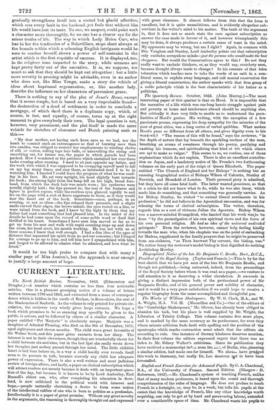The Quarterly Review. October, 1863. (John Murray.)—The most interesting paper
of this quarter is that on Hood. It is impossible that the narrative of a life which was one long heroic straggle against pain and poverty at home and intolerance abroad should be anything else. But critically it does very little to enable us to understand the pecu- liarities of Hood's genius. His writing, with the exception of a few passionate poems, expressing his deep sympathy for the miseries of the poor of great cities, was a long series of verbal quibbles. What makes Hood's puns so different from all others, and gives dignity even to his word-wit? "The reason of this will be found," says the reviewer, "in the depth of nature that lay beneath the sparkling surface of the man, breathing an aroma of sweetness through his poetry, purifying and exalting his humour, and spiritualizing that kind of wit which others are apt to make so vulgar." This seems to us, we confess, one of those explanations which do not explain. There is also an excellent contribu- tion on Japan, and a laudatory notice of Mr. Fronde's two forthcoming volumes on the early part of the reign of Queen Elizabeth. The paper entitled " The Church of England and her Bishops " is nothing but an amusing biographical notice of Bishops Wilson of Calcutta, Stanley of Norwich, and Blomfield of London. Their personal piety is admitted, but they have all some fatal fault. The latter wanted prescience, so that in a crisis he did not know what to do, while he was also fussy, which made him do something, and that something was generally unwise. As for Bishop Stanley, he wished "to extend liberal sentiments in his profession," he did not believe in the Apostolical succession, and was for relaxing the terms of clerical subscription. The writer, therefore, regards him as a sort of virtuous Julian the Apostate. Bishop Wilson was a narrow-minded Evangelical, who fancied that his work was:to be done " by the promulgation of his own spiritual views and the force of his own personal religion. He had no idea of the universal undivided episcopate." Even the reviewer, however, cannot help feeling kindly towards the man who, when his chaplain was on the point of embarking for Madras, supplicated in the family prayers that he might be preserved- from sea-sickness, "as Thou knowest Thy servant, the bishop, was." We rather fancy the reviewer's model bishop is that dignified do-nothing Archbishop Howley.






























 Previous page
Previous page